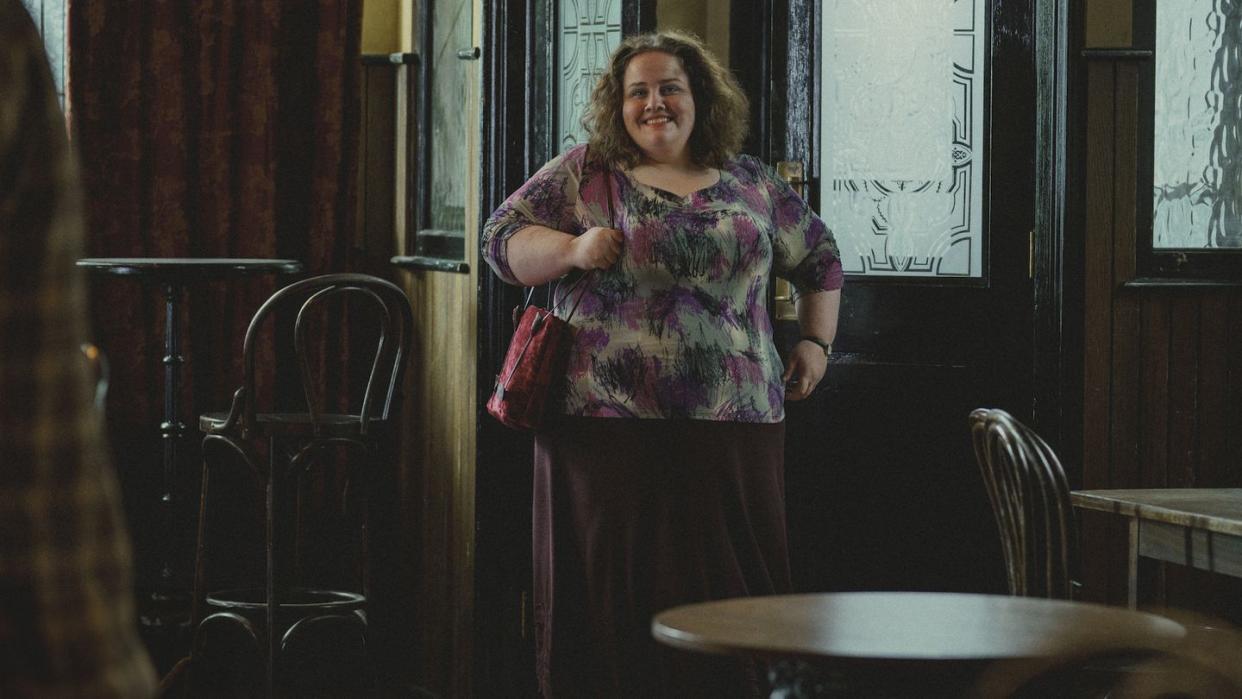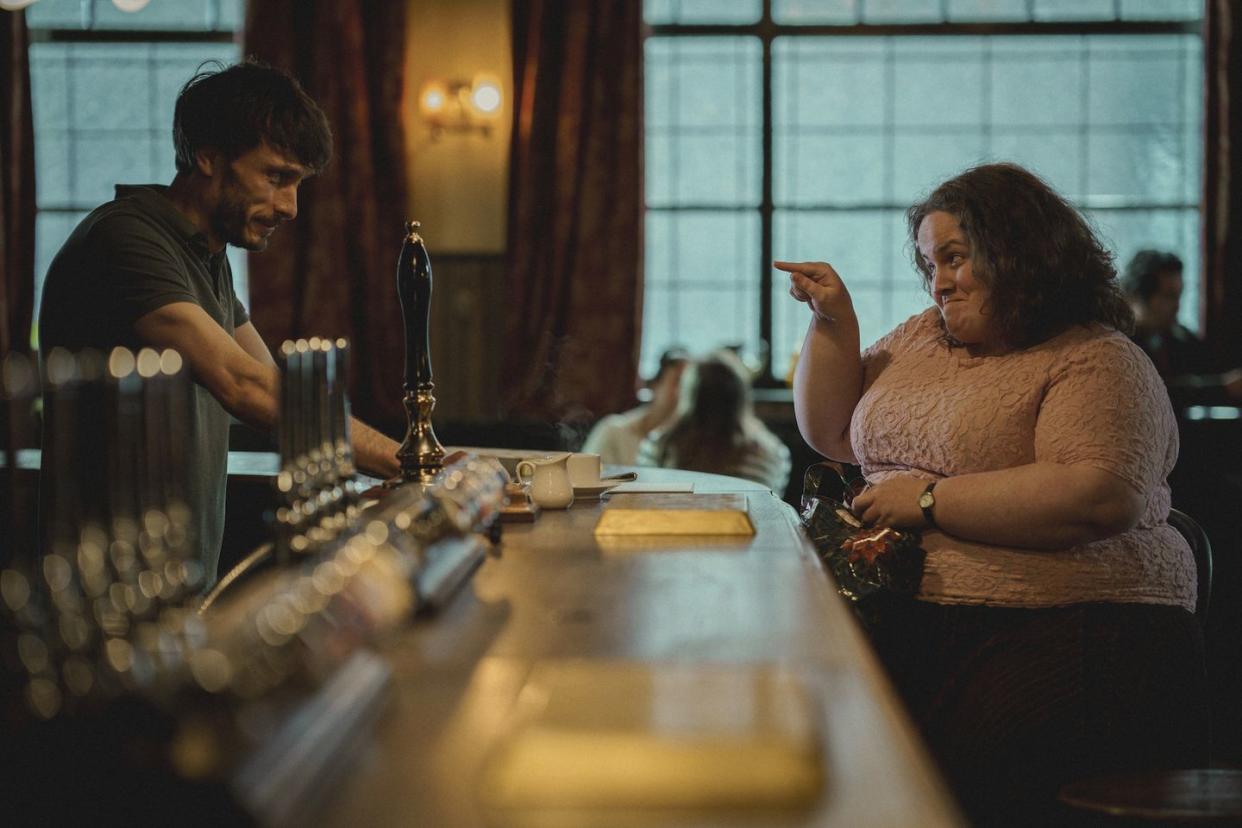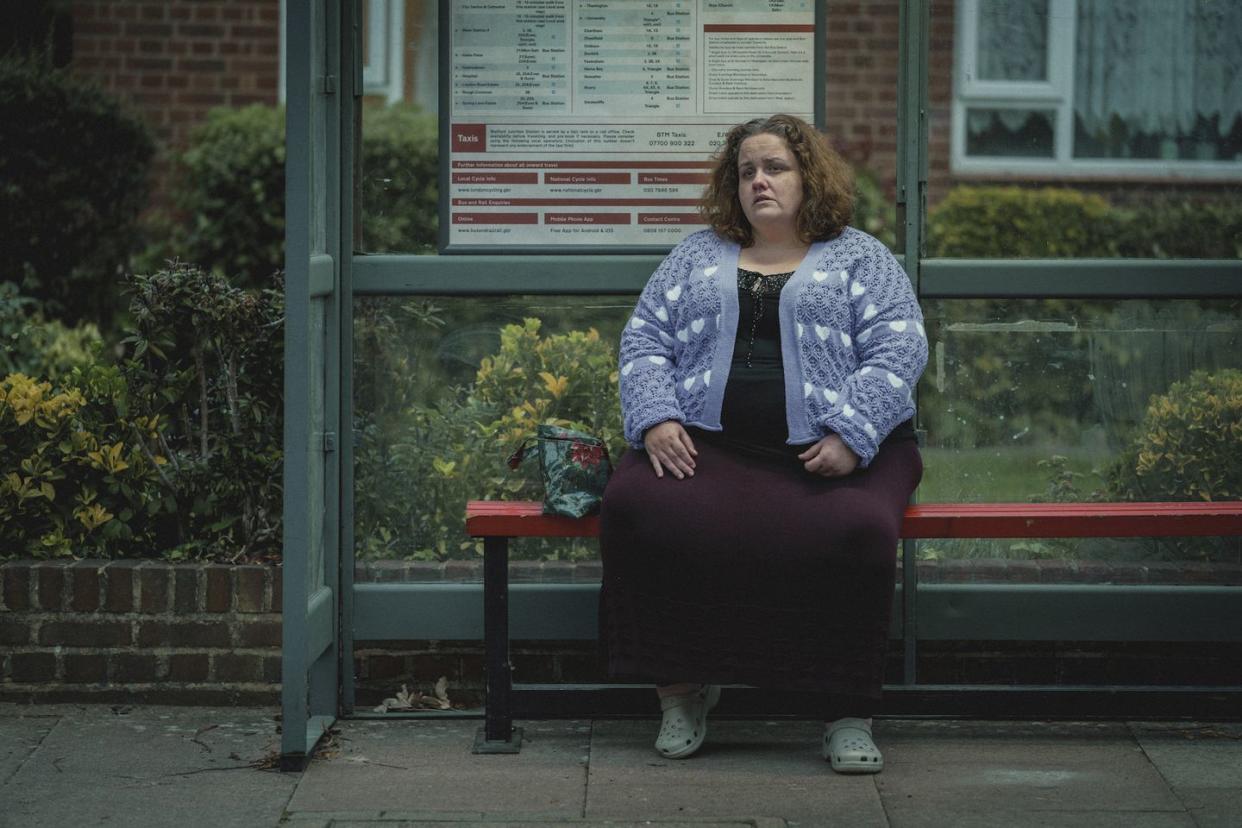Jessica Gunning on “Baby Reindeer”’s Runaway Success: “People Are Hungry for Messy Stories”

"Hearst Magazines and Yahoo may earn commission or revenue on some items through these links."
British actor Jessica Gunning had a feeling Baby Reindeer was going to strike a chord with viewers from different walks of life. But in the four weeks since its debut, the Netflix limited series has become an unexpected cultural phenomenon, topping the streaming giant’s TV charts in over 70 countries and reportedly racking up over 224.2 million viewing hours.
An unflinching exploration of the trauma and aftereffects of abuse, Baby Reindeer was born out of creator, writer, and executive producer Richard Gadd’s experience being stalked by an older woman who frequented the pub where he worked. In the seven-part series, Gadd plays Donny Dunn, a struggling comedian working as a bartender, who one day offers a cup of tea to a struggling ex-lawyer named Martha (Gunning).
What begins as a simple act of kindness quickly devolves into a one-sided obsession, with Martha showing up regularly to Donny’s place of work and stand-up comedy shows and harassing him with a barrage of emails, voicemails, and social media posts. While attempting to stop his stalker from wreaking havoc on his day-to-day life, Donny begins dating a trans woman named Teri (Nava Mau) and is forced to reckon with the severe abuse he endured years earlier at the hands of Darrien O’Connor (Tom Goodman-Hill), a prominent television writer who, under the guise of offering mentorship to Donny, repeatedly drugged and sexually assaulted him.
“I just thought it was one of the best things I’ve ever read,” Gunning tells Harper’s Bazaar of Baby Reindeer’s script, on a recent trip to Los Angeles. “I think he managed to create such an incredible character in Martha and such an amazing dynamic between her and Donny. The thing I loved about it was, if you read the top line of [the story], a woman walks into a bar, gets given a cup of tea on the house, and ends up stalking this guy—that just doesn’t do justice to how complicated it was and how honest [Gadd] is in the telling of it.”
Gunning, by her own admission, has been wanting to help tell Gadd’s story for the better part of the last decade. She had seen Gadd’s Edinburgh Comedy Award–winning 2016 show Monkey See Monkey Do, which detailed his experiences with sexual assault and forms the basis of the harrowing fourth episode of the series. When Baby Reindeer premiered as a one-man show in 2019, Gunning couldn’t get a ticket to the sold-out play, so she bought a copy of the text. A few years later, when the time came to audition for Martha, she jumped at the opportunity to bring unexpected depth to a woman who could easily come across as one-dimensional.
“I’ve been acting now for about 17 years, and I can honestly say I’ve never ever read a part like this before,” says Gunning, who has spent most of her career playing the comic relief. “I don’t know if it’ll take another 17 years for a part like this to come along again. I don’t think there will be [another role like this one], really.”
Below, Gunning explains her approach to embodying Martha, what she thinks Donny and Martha see in each other that bonds them in an uncomfortable way, and what she has made of the growing speculation about the real-life individuals who inspired the series.
This story is told entirely from Richard Gadd’s perspective, and even though he has a tremendous amount of empathy for Martha, Baby Reindeer is still told through his specific lens. What specific backstory did you establish for yourself to better understand where Martha is coming from in the story and what she sees in Donny?
My clues for the character were in the script. I’m not doing an impersonation of a character; I’m doing an interpretation of Martha. So I invented certain things here and there to make sense of certain moments in the script. But I think that final voicemail that she leaves for him captures why he’s so special to her, why she felt so connected and so safe around him. He reminds her of this childhood toy she found so much comfort in, so I think there’s something quite moving about that. That’s the thing I used to always go back to, to try and find the core of the character.
I also imagined what it would feel like if you are a kind of woman who goes around the world like Martha does and is ignored quite a lot of the time. [I imagined what it would be like] to have this young guy flirt with her occasionally, show her a bit of interest, and say things like, “Oh, I bet you have great dinner parties.” I used to just imagine what him seeing her would’ve felt like to her.
But she’s also an insightful character. She sees something in him that not many others do. She even says, “Something happened to you. Someone hurt you.” I think that is what kind of bonds them so quickly. These [are] two lonely, lost people who find each other at this time in their life when they really need each other. I think that’s what is so compelling about the story.

In the first episode, Martha says to Donny, “Do you ever want to unzip people and climb inside them?” It would have been so easy for you to play up the absurdity of that moment, but you delivered those lines in an earnest way that felt like it was coming from a real place of wanting to connect with Donny.
You’ve actually reminded me: I remember going through the lines for the audition, and the audition scene was that zipping-up scene. Before we did it, I said [to my friend], “Oh my God, this is my favorite scene. I just find it so emotional. It just breaks my heart. I love it.” In no way did I think that was a crazy thing to say [in the context of the show]. [Laughs.] I think it’s actually so sweet. She wants to snuggle away inside him and feel safe.
I genuinely never really saw the crazy part of her. I think it would be a mistake to play that side of it, because from her point of view, it’s actually a nice thing that she’s saying. I suppose what I would do alongside Weronika [Tofilska], our brilliant director, is track those moments and make sure we were on the same page in terms of what was happening from Martha’s point of view. Because as soon as you get into a realm where you’re like, “Okay, I need to play this bit really scary,” I think you lose the character completely. Her intention would always have been good with Donny, but it just would’ve been received in potentially a scarier way [than she had intended] or an ominous way.
At a certain point in the show, Donny goes out of his way to avoid interacting with Martha in person, but she eventually gets ahold of Donny’s parents’ phone numbers and then his own phone number and starts leaving all kinds of threatening voicemails. How long did it take for you to record the various voicemails we hear in the show?
It would’ve been about six months after we finished filming that we went and did those voicemails in the studio, in ADR, which is part of the postproduction process. I recorded some guide voicemails on my phone and sent them when they were filming, so that it could be played back or listened to with earphones by Richard, if that would help him get into the character, so that it’s not just somebody off-camera reading [the lines from the voicemails]. But then we had to obviously redo all of them for the show.
I think it took probably two or three days on and off to get all of that ADR done. Weronika would’ve been there for those—and also Richard occasionally, just to make sure we were getting the tone of each of them. [The messages] jump in and out of different moods, and there’s so many different categories, so we tried and coupled them together as much as we could [to record the same kinds of voicemails at once]. Actually, the last voicemail we ever recorded in ADR was the final voicemail [in the show], so it was kind of like a final goodbye. It was quite emotional that day.
In the final episode, Martha pleads guilty to stalking and harassing Donny and his parents. There’s this final shot of Donny and Martha catching each other’s eyes for the final time, as she gets led out of the courtroom after her plea, that particularly stood out to me.
It was actually the last scene I ever filmed. [Scenes] are all shot out of order, so it’s quite rare that your final day is also [your] final scene, so it felt quite special in that way. I was really not expecting to be as emotional as I was in the scene, but I think it dawned on me how much it would’ve taken her to admit that she was guilty when the judge said, “What do you plead?” Because every instinct in her probably would’ve been to say “Not [guilty],” but the fact that she does [admit her guilt] is almost like her own apology.
I remember the first day I got the script. When I read that, it just brought a lump to my throat, because it isn’t a jump-scare moment [as Gadd described it in the script]; it’s just two lost people. There’s no victory there. He’s not watching her be led out going, “Yeah! Take her down!” He feels so sorry for her. And then to add that moment in the bar when he realizes why she called him “baby reindeer”—I think it just breaks his heart a little bit more.

There are a number of ways to interpret why Donny breaks down in front of a bartender in the final scene. What was your interpretation?
I think he’s so cleverly written that moment, just because it reminds us that the first time we meet Martha, she’s clearly going through something as well, and there was a judgment [Donny] made [about her]. He says in the voiceover: “Pissy—that’s the first thing I felt when I saw her.” But from my point of view, that moment with the bartender and Donny after listening to that voicemail specifically is Donny’s way of showing he understands her more. That act of kindness when someone’s at their lowest ebb like he is [in that final scene] can give you this hopeful feeling that you don’t think you’re going to have, and I think that’s what happened when [Martha] met him. She felt hopeful and seen for the first time, and I think [the ending] mirrors that [opening scene] so beautifully. I think it’s such a clever way to end the show.
Baby Reindeer has become a word-of-mouth hit since it debuted last month. What have you made of the response to the series?
When I watched it for the first time in full, I definitely knew that people who saw it would feel something and respond to it and think and talk about it, but I don’t think any of us ever thought it would be this big this quickly. Both Richard and I are completely shocked and thrilled at the response that it’s been having. Very rarely [do] you get to be part of a show that’s having this kind of reaction. Richard has had so many people reach out to him to say how they felt so alone with what’s happened in their own lives, and that after watching episode four [which depicts how Donny was repeatedly sexually assaulted by his former mentor], they feel less alone, or they’ve reached out to get help. I just think it’s incredible to be part of a show that’s doing that.
At the same time, some viewers seem to be morbidly fascinated with the real-life individuals who inspired the series, and some have even attempted to unmask the real-life identities of the characters in the show. What have you made of that discourse?
I understand the fascination completely. People nowadays are obsessed with true stories, and I absolutely get why people would want to see or learn about or find who these stories are really about. But this is Richard’s story, told through Donny’s point of view. As a survivor of sexual abuse, as somebody who has had a stalker, he’s allowed to tell that story and not have it be about the real people. It’s his version of that story, and it should be taken as a package, in a way, for what it is.
There’s so many themes in the show, and the biggest one I always connect with is the theme of trauma throughout it. He’s written these characters, and each one of them have clearly gone through some form of trauma. I think it shows that people out there are really hungry for messy stories, for complicated stories. They don’t want things to be tied up all nice and neat at the end. I think that’s what this show’s done so well: Richard’s been very truthful and honest about his mistakes, but he’s also managed to create something that is a piece of art, really. Hopefully, people will take that for what it is and not really go there in terms of real people.
And now this work of art has put all of you on the short list for Emmy nominations.
If you’d have told me two years ago that we were even talking about things like the Emmys, I really wouldn’t have believed it. I didn’t know that it was going to have that kind of reach, so to even be here discussing it is genuinely an honor—and even the thought of [the show] being put forward to be nominated is brilliant. I’m just so proud to be part of it and proud of Richard and glad that so many people are talking about it.
This interview has been edited and condensed for length and clarity.
Baby Reindeer is now streaming on Netflix.
You Might Also Like
